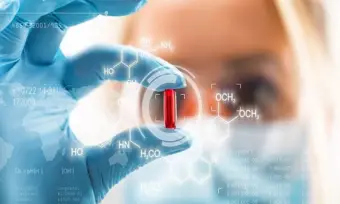Relugolix API Manufacturers & Suppliers
Find, compare & contact
Filters
Custom request?
Type
Production region
Qualifications
Country of origin
Producer
+ 0
All certificates
Produced in:
Established in: 2008
MOQ: 1 kg
Employees: 300+

More than 150 patents based on independent intelligence

Expertise in anti-tumor, anti-diabetes and cardiovascular API and intermediates.

GMP facility with annual production capacity of 300M
+ 0
All certificates
Distributor
Produced in:
Established in: 2011
MOQ: -
Employees: 25

Technical expertise ensuring optimal selection and development of APIs and intermediates

Globally connected with multiple GMP-compliant manufacturing facilities

Regulatory excellence with a dedicated team with global reach
+ 0
All certificates
Producer
Produced in:
Established in: 1984
MOQ: -
Employees: 21,650

Diverse portfolio of 180+APIs

1754+ DMF across global markets

1100+ patents filed, and more than 70 own patents granted
+ 0
All certificates
How does it work?
You can register for free as long as you are registering on behalf of a legal company related to the pharmaceutical industry
Search in the search bar the product that you’re looking for. We’ll show you an overview of all available suppliers. Use the filters to select the relevant suppliers only
Have you found interesting suppliers? Then it’s time to contact them. Use the send inquiry button and send them a message. You can send for each product, 3 inquiries per week
Suppliers get notified by Pharmaoffer that they’ve received a new inquiry. They will come back to you with their questions, certificates, and offer in the chat on Pharmaoffer. We will send you an email in case of any news
Does the supplier meet your quality and commercial requirements? Then you can place the order. Just follow the steps of our order module
Looking for Relugolix API 737789-87-6?
- Description:
- Here you will find a list of producers, manufacturers and distributors of Relugolix. You can filter on certificates such as GMP, FDA, CEP, Written Confirmation and more. Send inquiries for free and get in direct contact with the supplier of your choice.
- API | Excipient name:
- Relugolix
- Synonyms:
- Relugolix
- Cas Number:
- 737789-87-6
- DrugBank number:
- DB11853
- Unique Ingredient Identifier:
- P76B05O5V6
About Relugolix
Relugolix is a medication used in the treatment of prostate cancer. It works by reducing the production of certain hormones that stimulate cancer growth.
Relugolix is a type of Gonadotrophic
Gonadotrophic is a subcategory of pharmaceutical active pharmaceutical ingredients (APIs) that plays a crucial role in reproductive health. It includes a group of naturally occurring hormones known as gonadotropins, which are produced by the pituitary gland. These hormones, namely follicle-stimulating hormone (FSH) and luteinizing hormone (LH), regulate the reproductive processes in both males and females.
Gonadotrophic APIs are commonly used in various medical applications, particularly in the field of assisted reproductive technology (ART) and fertility treatments. They stimulate the development of ovarian follicles in females, promoting ovulation and enhancing the chances of successful conception. In males, these APIs stimulate the production of sperm cells and support the production of testosterone.
The pharmaceutical industry produces gonadotrophic APIs through advanced biotechnology techniques, such as recombinant DNA technology. This process involves the use of genetically engineered cells, typically from Chinese hamster ovary (CHO) cells, to produce highly pure and bioactive forms of FSH and LH.
Gonadotrophic APIs are typically formulated into injectable preparations, ensuring their efficient delivery and absorption into the bloodstream. These formulations are administered under the guidance of healthcare professionals and require precise dosing to achieve optimal therapeutic outcomes.
Overall, gonadotrophic APIs have revolutionized the field of reproductive medicine, providing effective solutions for infertility and hormonal imbalances. Their usage has helped countless individuals and couples to overcome fertility challenges and realize their dreams of starting a family.
Relugolix (Gonadotrophic), classified under Hormonal Agents
Hormonal agents are a prominent category of pharmaceutical active pharmaceutical ingredients (APIs) widely used in the medical field. These substances play a crucial role in regulating and modulating hormonal functions within the body. Hormonal agents are designed to mimic or manipulate the effects of naturally occurring hormones, allowing healthcare professionals to treat various endocrine disorders and hormonal imbalances.
Hormonal agents are commonly employed in the treatment of conditions such as hypothyroidism, hyperthyroidism, diabetes, and hormonal cancers. These APIs work by interacting with specific hormone receptors, either by stimulating or inhibiting their activity, to restore the balance of hormones in the body. They can be administered orally, intravenously, or through other routes depending on the specific medication and patient needs.
Pharmaceutical companies employ rigorous manufacturing processes and quality control measures to ensure the purity, potency, and safety of hormonal agent APIs. These APIs are synthesized using chemical or biotechnological methods, often starting from natural hormone sources or through recombinant DNA technology. Stringent regulatory guidelines are in place to guarantee the efficacy and safety of hormonal agent APIs, ensuring that patients receive high-quality medications.
As the demand for hormone-related therapies continues to grow, ongoing research and development efforts focus on enhancing the effectiveness and reducing the side effects of hormonal agent APIs. This includes the exploration of novel delivery systems, advanced formulations, and targeted drug delivery methods. By continuously advancing our understanding and capabilities in hormonal agents, the medical community can improve patient outcomes and quality of life for individuals with hormonal disorders.
Relugolix manufacturers | traders | suppliers
We have 4 companies offering Relugolix produced in 0 different countries.
Get in contact with the supplier of your choice:
- Veeprho Group from Czech Republic, product country of origin Czech Republic
- Tianjin Pharmacn Medical Technology Co., ltd from China, product country of origin China
- Global Pharma Tek from India, product country of origin India
- Dr. Reddy's from India, product country of origin India
Let the supplier know whether you are looking for a product with a specific monograph such as EP (Ph. Eur.), USP, JP, BP or another quality. Or, whether you are looking for hydrochloride (HCl), anhydricum, base, micronisatum or a specific purity.
You can use the filters to find high-quality suppliers. For example, you can select GMP, FDA or ISO certified suppliers. Visit our FAQ page or use the chat box in the corner to get more information about Pharmaoffer.











